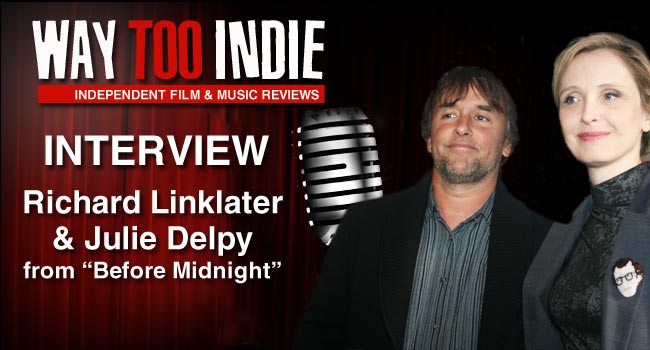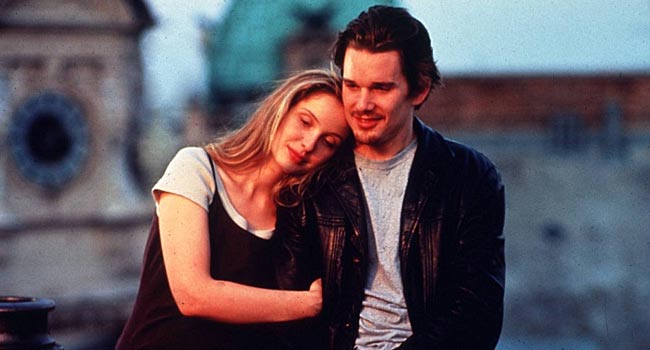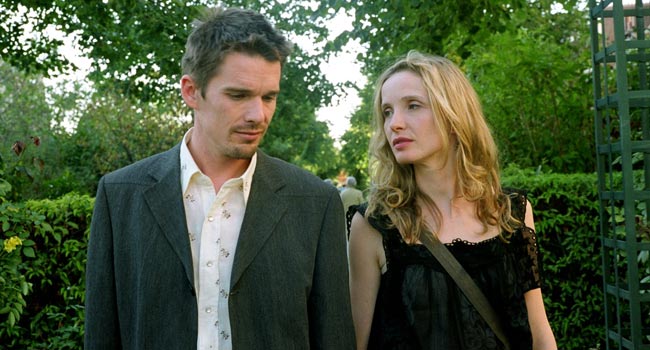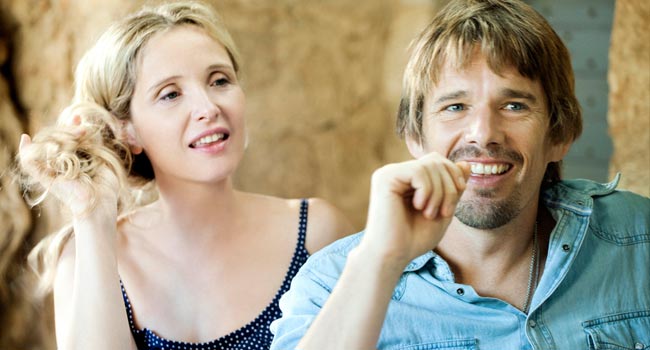Interview: Richard Linklater & Julie Delpy of Before Midnight – Part 1

In 1995’s, we met Jesse and Celine (Ethan Hawke and Julie Delpy, respectively) on a train in Vienna and watched them fall in love as they explored the city in Before Sunrise. Nine years later (in real-world time and in theirs), we revisited them in Paris as they reconnected and rekindled their romance in 2004’s Before Sunset. Now in 2013, we check in on their lives yet again in Before Midnight, Richard Linklater’s third installment of his unprecedented romance saga which we saw at SFIFF. Now in their early 40’s and with twin girls, the couple are on holiday in Greece with friends. With their romantic spark smothered by the stresses of reality and their divergent life ambitions, they wrestles with each other over the control of their family’s destiny.
Independent film legend and director of Before Midnight, Richard Linklater (Dazed and Confused, Bernie), and star Julie Delpy (2 Days in New York, 2 Days in Paris) spoke with Way Too Indie in an in-depth, extended interview. In part 1, they discuss the current state of independent film, working with Godard, growing up with the three films, the prospect of a fourth, and more.
Read Part 2 of our interview with Richard Linklater & Julie Delpy
(Before I could ask my first question, Delpy and Linklater took the reins, jumping into a conversation about eating food during production.)
Julie Delpy: We eat, and we enjoy food.
Richard Linklater: The [food on] the first shoot (of Before Sunrise) was alright.
JD: Paris was ok, but not great. It was ok, though. Greece is the top, food-wise. [This is] all we talk about! (laughs).
RL: Food has never played a part in any of the movies. [Maybe] in the next movie (laughs).
JD: [Jesse and Celine] won’t even try to have sex anymore. They’ll just eat!
WayTooIndie: That would be fantastic! Just them eating together, getting old.
JD: They wouldn’t fight, because they’re fed and happy!
WTI: I want to talk about the film industry today. At the San Francisco International Film Festival, Steven Soderbergh made a ‘State of the Industry’ address.
RL: Who better to ask than the guy who quit!
WTI: Exactly (laughs). He explained his departure from the film industry, and basically said that none of the studios are taking risks and are relying solely on the tentpole film business model, stifling creativity. Let me ask you two—what is the state of independent film?
JD: All of my films are financed in Europe, and [Before Midnight] was half financed in Europe.
RL: Clearly, the risks to take are in the indie realm, but it’s been that way for a long time. I think it’s a good time to be a filmmaker. Technology and distribution are getting better. There are new formats. I think it’s a good time…
JD: …to make indie film! I remember working with Jean-Luc Godard in 1987 on History of Cinema. He was filming in video, and I was like, “Ahh! You’re filming in video, that’s horrible!” He said, “It’s the future of real filmmakers, because it’s going to be cheaper. Those huge films that cost $200 million [and even] tiny films will be shot on video. I was like, “What is he talking about? He’s crazy!” But, Godard is a genius, and his mind is in the future.
RL: He sees forward and backward! (laughs) He’s our professor.
JD: I think he might have invented a time machine. At the time, I was like “Oh, video is horrible!” But he was right! [All the way back in] 1986.

Julie Delpy and Ethan Hawke in Before Sunrise (1995)
RL: I think studios have figured it out. I’ve been lucky enough to have films made at the studio level. Dazed and Confused was a studio film. Universal made that film.
JD: There are good people in some studios, and some terrible people that end up being studio heads. I meet studio people sometimes—they never hire me in the end (laughs), but I meet some that mean well, at least. Then, I meet some that are just businessmen who have no clue what a movie is and they don’t give a shit. You [see] everything in this business.
RL: Again, studios have figured it out—what they do and, most importantly, what they don’t do. Then, it’s just up to the rest of the world to fill in that gap. I like that that’s at least on the table. A lot of time is wasted over years just trying to get films made in the studio system. It’s a different league. Once you accept that and forget about it, there’s nothing really to complain about.
JD: [Studios] don’t really want to dig deep into human nature [in their films], you know? [They don’t make those] kinds of films. I went to a meeting recently for a studio film, and the guy who got the [directing] job was a commercial director who came in with a reel of, like, five [other] films he put together. It was so dumb! [He] put in a bit of Juno, a bit of this, a bit of that, and said “This is what I’m going to do!” Any retard can do that! But that’s what the studio went for. Okay, fine. That’s what the movie is going to be—a combination of those five films. A formula. That’s fair. But that’s why [Richard] and I raise money a certain way.
RL: Everybody is kinda on their own.
JD: Europe has a lot of potential in terms of financing real independent films.
RL: We started off [on this project] studio funded, believe it or not. Before Sunrise had a $7 million budget, but we went through Castle Rock and Columbia back in ’94. We were a ‘trickle-down’ studio funded film. Now, we’re off-the-grid independent, but what’s the difference?
WTI: I was fortunate enough to have grown up with the Before films. I saw the first one when I was about 11.
JD: Wow!
WTI: Years from now, when people look back on this series of films, they’ll experience them in a different way. They’ll pop in Before Sunrise, watch it, then pop in Before Sunset and watch you (Julie) and Ethan (Hawke) age nine years in a matter of seconds. That’s amazing in its own way, but can you talk about the special experience of growing up with the films?
RL: You’re living with the films, aging with the films. That’s the intention. That’s what we’re doing, obviously. Those who are chronologically aligned with the films—that’s a special thing.
JD: [There’s] no aging make-up there. It’s not really acting, you know. There aren’t fake noses or fake wrinkles. It’s the real deal.

Ethan Hawke and Julie Delpy in Before Sunset (2004)
WTI: In Before Sunset, you have that scene with Ethan where you mention the line that developed in between his eyes after nine years. You can’t do that in any other type of project.
RL: The lack of vanity with Ethan and Julie is important. In the films—we’re all three of us doing this—we’re taking where we are at that moment and whatever life has thrown at us in the past nine years [and] using that as the clay for what we’re sculpting.
WTI: You’ve talked before about how at the end of filming Before Sunrise, you had no intention to make a sequel. Same for Before Midnight—no plans for it after Before Sunset wrapped.
RL: Oh yeah, that’s for sure.
WTI: How long after wrapping the films do the gears start turning in your heads for making the next one?
JD: About five years. We joke around about it.
RL: Yeah, we joke about it because we know Jesse and Celine are still sort of…out there. We also know, as of right now, we have no ideas worthy of making another sequel seriously. [We] have to live the years.
WTI: When the three of you were joking with each other in the five years following Before Sunset about making a sequel, was there a specific story element or idea that you came up with that was the key to you saying “Yeah, we need to make another one.”
RL: We had some general themes. We knew what we couldn’t do again, and we knew where we had to go, but how we got there—we had the luxury of a couple years where we threw out ideas [at each other], developing what we thought would work. It’s rare that you get the chance to hold onto an idea for months, develop it, and be able to change it, take it somewhere else.
JD: Also, we’re really the deciders [in the process]. There’s no one to tell us what to do. [The time we had] was a luxury we wouldn’t have in the studio system. Doing this third film and going into a place that’s forbidden territory for a studio film—it’s a relationship, they’ve been together for a long time, they fight for 25 minutes [straight], it’s talking all the time, there’s no plot, no FBI or anything like that. It’s forbidden territory, and it’s great that we have the luxury to go there. Richard figures that all out!

Julie Delpy and Ethan Hawke in Before Midnight (2013)
RL: Before Sunrise was a studio film on a super indie budget. The second one was handled by an indie division of a studio. For this one, we were selling it at Sundance trying to get a distributor, completely off-the-grid. It kind of explains how the studio system has changed. My friends who are in the studio system really like the Before films! They just know the studios aren’t going to make them. The studios don’t [pass on these films] because they don’t like them—it’s just not what they do. It doesn’t pay the bills. I love the studio system, in a way. It’s kinda pure.
JD: At least they’re clear, you know? Sometimes, studios that are trying to make ‘indie films’ that aren’t actually indie bothers me more.
RL: Yeah, I hate that middle ground. It’s almost more annoying. They give you an indie budget, and yet, they expect $100, $200 million dollars. ‘Indie films’ are still cast with big names. I was able to do movies without any name actors. Dazed and Confused is another example of how things have changed. An indie distributor today wouldn’t do Dazed, much less a big studio, because there aren’t a lot of name actors in it.
JD: They’re names now! Now, you’d have to pay $50 million for that cast!
Don’t miss Part two of our extended interview, in which Linklater and Delpy discuss the stresses of pulling off Before Midnight‘s extra-long-takes, the evolution of the series, the significance of the sun and midnight in the films’ titles, the great Robert Bresson, and more.
